Digital Transformation in Africa
Estonia´s experience in D4D Hub project

Digital transformation has become a crucial tool for economic growth and development in Africa. Estonia, a small country with a population of 1.3 million, has implemented a successful approach to digitalisation that focuses on whole-of-society collaboration, public sector reform, digital capacity building of people, and investment in interoperable IT solutions that prioritise data exchange and cybersecurity. The limited resources have forced Estonia to be innovative and efficient in its use of technology. As a result, Estonia has become a leader in e-governance and digital services. The Estonian experience provides valuable lessons to enable leapfrogging in digital transformation for governments worldwide - including in Africa.
Cooperation between Team Europe, Team Estonia and African partners
The African Union-European Union Digital for Development (D4D) Hub, a European Union, Estonia, Belgium, Germany, France and Luxembourg joint programme, promotes digital innovation and collaboration across Africa. The project emphasises the importance of win-win partnerships, multi-stakeholder expertise, a human-centric approach, and data security and protection. These were the key priorities in all the activities Team Estonia conducted within this programme.
“Estonia has a remarkable success story on the digital transformation of the society. We have seen how digitalisation helps achieve sustainable development goals, and we are ready to share our experience with other countries. Collaboration as Team Europe, and joining our expertise, is crucial to cooperate with partner countries on their digital transformation journey to the benefit of their people. In digital sphere, the collaboration is promoted through D4D Hub, where Estonia is one of the founders and very active members.”
In 2023, Estonia celebrated its 25-year anniversary of being a donor country. Through development cooperation, Estonia is committed to contributing to global development and security and reducing poverty. Our cooperation is based on mutual interest and equal partnership; the horizontal priorities are human-centric digitalisation and empowerment of women and girls. Estonia has four priority countries for development cooperation in Sub-Saharan Africa; however, under the AU-EU D4D Hub project, Estonia cooperated with 9 countries to a larger or smaller extent - Namibia, The Gambia, Uganda, Egypt, Tanzania, Botswana, Zambia, Zimbabwe and Cabo Verde. The cooperation between African countries and Estonia is long-term and continues under different projects and programmes.
Overcoming challenges
While implementing our activities, the most significant precondition is to have a good understanding of the level of digitalisation and the preferred methods of communication and collaboration. This may be a challenge when starting cooperation with a new country or new counterparts, particularly when working online. However, it becomes easier once the partners can network and share knowledge, as happened under the AU-EU D4D Hub project. It was also valuable for collaboration to show the reality of digital life in Estonia and discuss our challenges with partners from the projects. Digitalisation is an ever-changing topic, and countries must always look forward to and be able to adapt to changes. This can be challenging for all countries, regardless of where they are on their digital maturity journey.
"Being part of Team Europe in the D4D Hub projects has been an invaluable experience for eGA. We were struck by the remarkable enthusiasm from all the countries we partnered with for how digitalisation can help improve their citizens' quality of life. This widespread enthusiasm is a clear testament to the potential benefits that digitalisation can bring to societies around the world."
"The people in African countries could experience significant improvements in their living standards, access to public services, and economic opportunities thanks to technological advancements.”
Technology to benefit the society
New technologies and mobile-first or voice-based digital public services could benefit many and reduce the digital divide in African countries. Political leaders see digitalisation as an opportunity for their countries. Digital transformation comprises of the revision of regulatory and administrative processes, budgeting decisions for the whole life cycle of the technology, involvement of many stakeholders within and beyond the public sector - the complexity of the process means that capacity building of public servants is crucial for the success. More cooperation between stakeholders is needed, considering the citizens, particularly vulnerable groups. Access to the internet remains an issue, especially in rural areas.
Team Estonia’s expertise
The digital landscapes of each country are unique and complex. Team Estonia’s strength comes from our experts in different fields and sectors, who have an extensive knowledge both from Estonia’s own transformation, but also from cooperating with many global partners. Understanding the specific needs and priorities of a partner country is prerequisite to build the collaboration that is useful for and contributes to sustainable growth of the partner country.
“Implementation of the AU-EU D4D Hub project activities was a unique and first of its kind experience for ITL. Being the umbrella organization for the ICT sector in Estonia, we were in a very good position to efficiently engage experts from the private sector as well as academia and to work closely with the eGA and EU level partners on many of the undertaken activities. The project was also an excellent opportunity to build on the contacts already existing on the African continent and build new ones – it was reassuring to see that the need and interest to take next steps on the digital transformation journeys of our African partner countries is there and more prominent than ever and it was a pleasure to contribute through our project.”
Team Estonia, comprising experts from various fields and organisations, worked on several projects, such as re-imagining data interoperability in Uganda's educational information systems, assessing Tanzania's digital readiness, and developing digital skills strategies to reduce the digital divide in Namibia. The leading partners were the Ministry of Foreign Affairs of Estonia, the eGovernance Academy (eGA), and the Estonian Association of Information Technology and Telecommunications (ITL). The experts were from Estonian public sector, private sector and civil society organisations - all with a background in digitalisation and many with solid experience in working with international partners.
Moreover, the project provided knowledge transfer opportunities and trainings in multiple partnering countries, networking opportunities, seminars, and conferences that fostered better stakeholder cooperation and understanding. In addition to capacity building and consultancy also two pilot projects were conducted – taking the expertise to a more practical level.
About AU-EU D4D Hub project
The African Union-European Union (AU-EU) Digital for Development (D4D) Hub project supports African institutions in laying the ground for an inclusive and sustainable digital transformation. The project works with African governments and regional organisations to advance digital cooperation with European partners. The project was the first implementation project under D4D Hub, the strategic platform that aims to strengthen digital cooperation between the European Union and its Member States and partner countries in Africa, Asia-Pacific, Latin America and the Caribbean and the EU Eastern Neighbourhood.
Estonia´s experience in African Union-European Union D4D Hub project
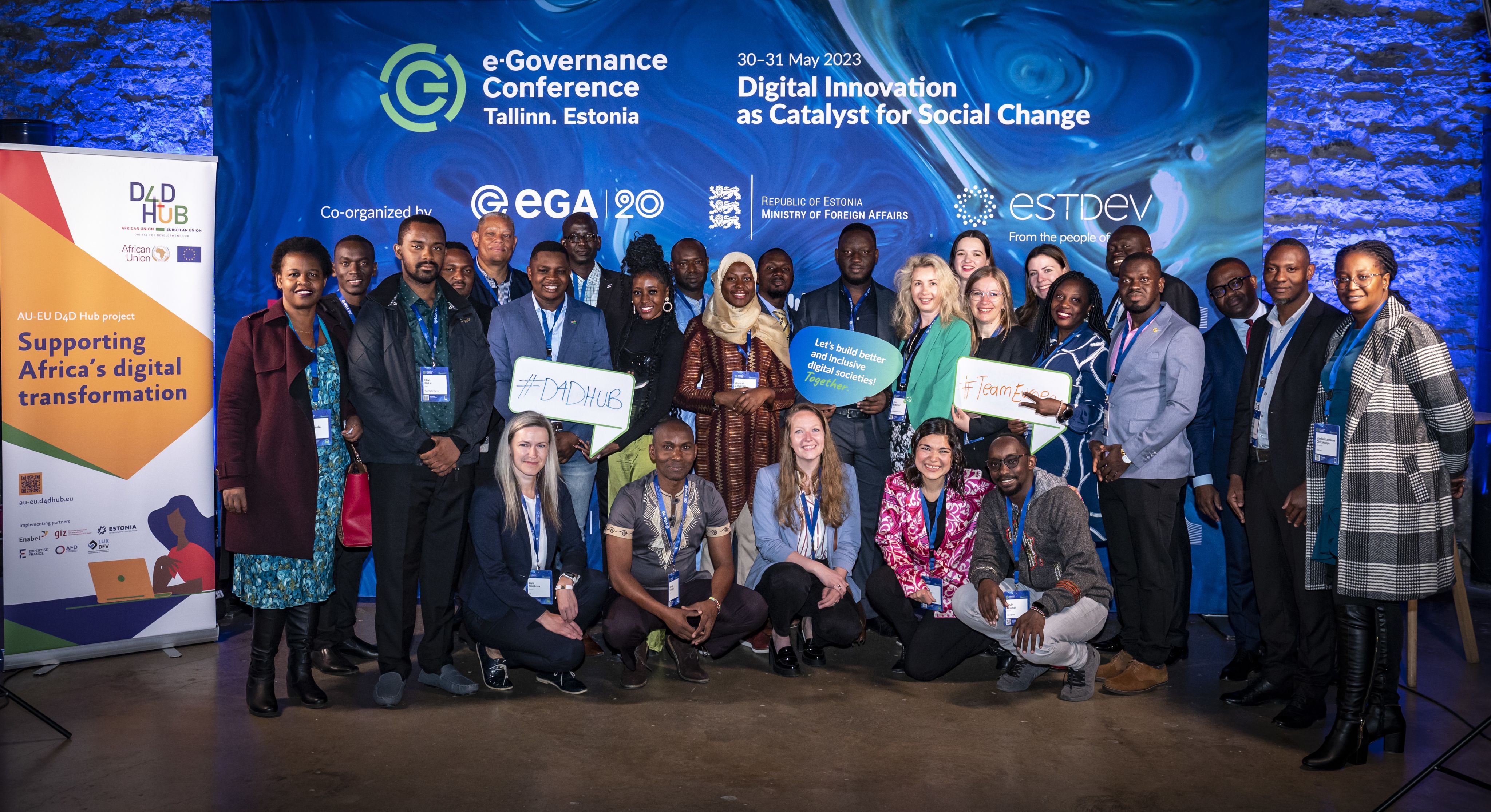
D4D Hub in e-Governance Conference
D4D Hub in e-Governance Conference
Reducing the Digital Divide in Namibia

Namibia and Estonia have been long-standing cooperation partners. Sarting from 2016 with the project to Design and Implement the Governmental Interoperability Solution in Namibia and continuing with different programmes on knowledge-building in e-governance, digital and entrepreneurship skills, innovation and environmental education. In 2023, The Ministry of Foreign Affairs, through the Estonian Centre for International Development financed several bilateral programs in cooperation with the Office of the Prime Minister and Namibia Investment and Promotion Board. Under the AU-EU D4D Hub project, Estonia collaborated on the national programme to reduce the digital divide in Namibia.
Reducing the Digital Divide
Namibia’s Ministry of Information and Communication Technology sought cooperation with Estonia on the operationalisation of their ambitious programme on enhancing the digital skills of communities in the rural ICT Centers across the country. The Estonian e-Governance Academy (eGA) under the sponsorship of the African Union-European Union Digital for Development Hub designed a roadmap and action plan to identify concrete steps for implementing the programme. As a practical step for launching the programme,
eGA created a training curriculum that focused on strengthening digital skills and inclusion and held a two-week programme in Namibia. The curriculum was introduced through various workshops to community members and at train-the-trainer seminars to enhance sustainability and scale-up. The train-the-trainer seminars were held in Ondangwa, Katima Mulilo, and Omaruru, while community workshops took place in Okatjali, Zambezi, and Ozondje. A strategic seminar to discuss digital divide reduction was also held in Windhoek.
The programme was successful, with around 200 participants showing a great desire to learn and teach others in the community. eGA also provided examples of public-private partnerships to help run joint digital skills training programs based on the Estonian experience.
Reducing the digital divide means tackling many topics, such as access to the Internet and devices, motivation to use digital tools and technology, digital skills levels, stakeholder engagement, effective communication, and the sustainability of digital skills projects. Namibia’s effort to address the digital divide through localised capacity-building provides a great example of how collaboration and innovative solutions can help bridge the gap.
"Cross-sector collaboration in building digital skills can enhance bridging the digital divide and equip our people for the digital economy’s future. We must proactively offer opportunities for reskilling and upskilling our society, which helps the digital economy.”
Emma Theofelus
Minister of Information, Communication and Technology of Namibia


Digital skills from a trainer’s point of view
Nuusita Ashipala, digital skills trainer
What motivates you to train others in your community?
My greatest motivation is to see everyone, particularly those at the grassroots level to be able to use a computer. In this fast-evolving technology, it is important for everyone to have digital skills because it is a vital information hub and opportunities, including job vacancies, are shared on social media platforms.
What was the biggest lesson learned from the train the trainers training?
The biggest lesson learned for me was to first establish the skills that the trainees before commencing with the training because many at times as trainees we prepare manuals and do not necessarily establish the level of skills the trainees have.
What would you say to people in Namibia who are thinking of starting to learn more digital skills but need additional motivation - why should they learn digital skills?
Well, everyone should have digital skills. The world is slowly transforming from papers into the digital world, and this calls on everyone to be digitally literate. My call is let's all join digital literacy classes irrespective of age or education level
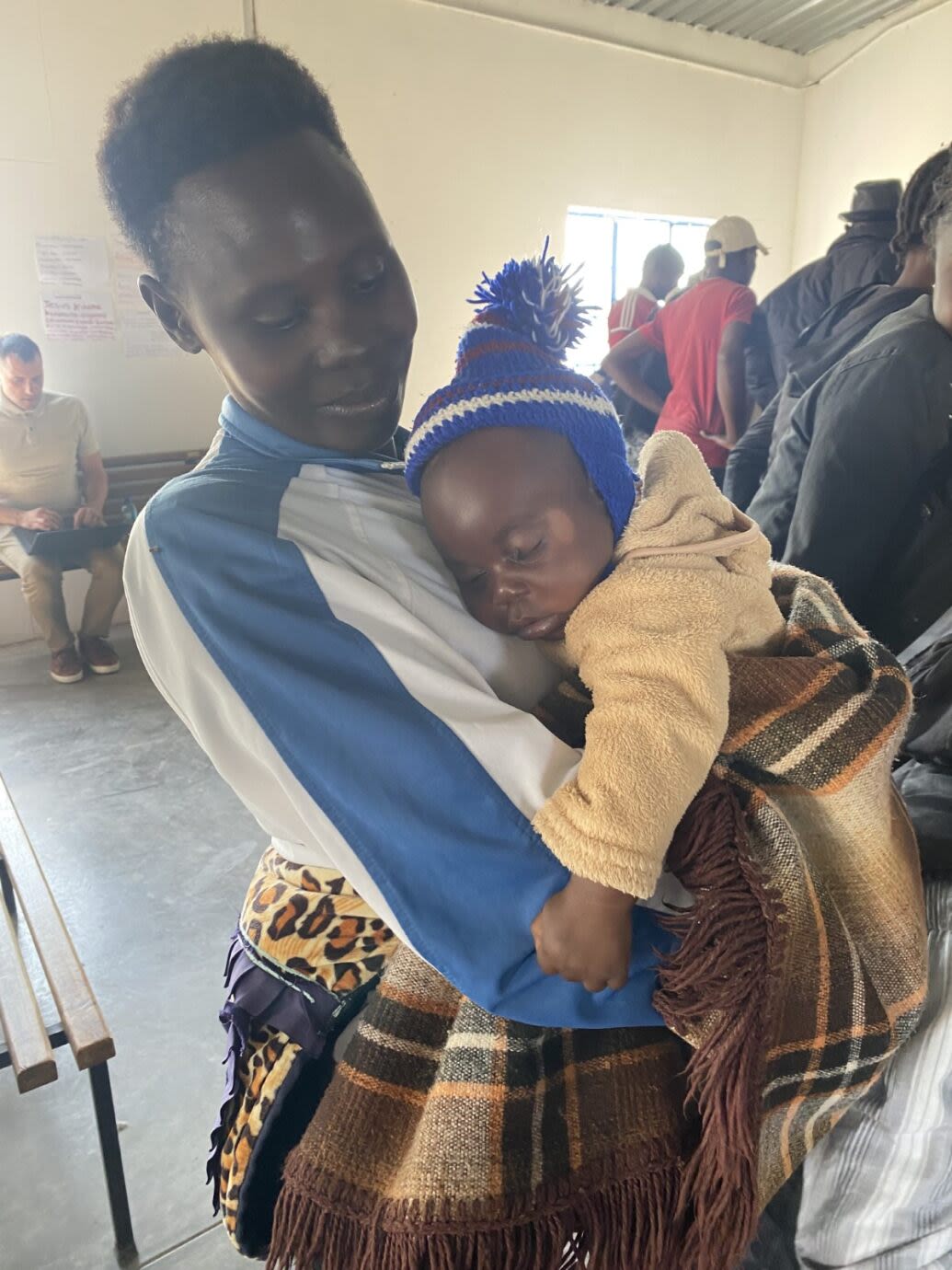
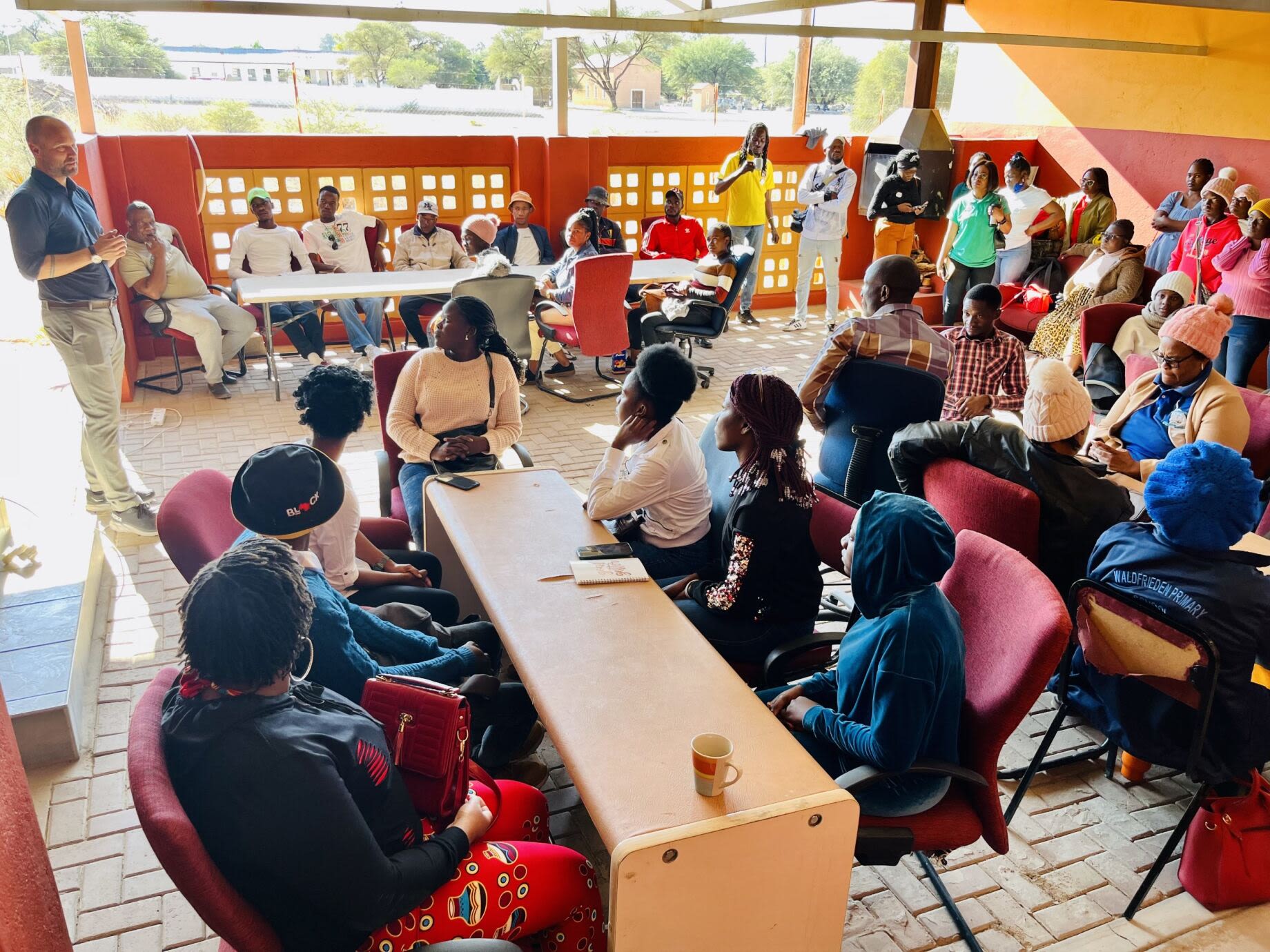
The Deputy Minister of Information and Communication Technology, Emma Theofelus, talks about the favourable environment for the development of a digital skills industry by harnessing untapped digital potential within the country during the digital skills training in Namibia.
By Federico Plantera
Three weeks in June 2023, eGA conducted seven trainings-workshops in Namibia, focusing on enhancing digital skills among the local population. The venture engaged both 'digital champions' (trainers) and community members.
Namibia has a goal, among others – to significantly increase the digital skills of its population by 2030. In fact, the target is to make everyone digitally literate. Everyone, 100% of its inhabitants. If it sounds ambitious, that comes to no surprise. It is an ambitious goal, but one that the Namibian Ministry of ICTs does not have to move towards all alone.
Experts from e-Governance Academy Kristi Kivilo, Randel Länts, Tiina Viiderfeld and Heilo Altin have spent three weeks in the country, as part of the project ‘Reducing Digital Divide in Namibia’. Initiatives, falling within the scope of activities of the African Union – European Union Digital for Development (AU-EU D4D) Hub, aimed to give the necessary knowledge and support to kickstart the process.
Digitalisation in Namibia: challenges and progress
With the digital literacy goal set, it is evident Namibia’s commitment to increasingly making its economy and society more digital. The country’s landscape in this sense is a fabric of action plans pursuing lasting change – but as all e-governance practitioners are aware of, that journey is riddled with challenges. Including connectivity issues, or limited access to computers.
“We saw regional differences in the opportunities for connectivity and digital skills learning opportunities. For reducing the digital divide this needs to be addressed with measures like digital skills training and “train the trainers” trainings.” Kivilo says. Taking into account the local regional context and tailoring trainings also based on what devices people use or have the access to.
In some regions, for example, people rarely encounter computers, relying primarily on smartphones and apps. However, even mobile connectivity can be inconsistent, with internet services either insufficient or prohibitively expensive. In contrast, more affluent areas show a higher level of digital engagement, showcasing good usage rates of government platforms and other online services.
Estonia has experienced this too. And efforts were directed at integrating technology into education, essentially since the 1990s. This was coupled with innovative approaches to digital skills training. The link is clear – connectivity or skills, taken alone or developed separately, do not fulfil the goal of achieving lasting impact. So, while infrastructure roll out advances, governments should not forget about skills development. To this end, Kivilo and Altin contributed to designing curricula that cater to varying skill levels, and address the specific digital challenges faced in Namibia.
Making teachers, while learning with the community
The training programs included sessions for both 'digital champions' (trainers) and community members. For the trainers, the focus was on the benefits of digital life and online safety, equipping them with the knowledge and confidence to conduct further training in their communities. The community workshops covered practical skills like using computers and smartphones, navigating the internet, email setup, and leveraging social media and communication apps safely.
“What made this program unique was its adaptability. The curriculum was tailored in real-time to match the varying skill levels of participants, even during the same workshop, but also address diverse needs across regions and areas,” Altin explains. This flexibility ensured that each training session was relevant and impactful, addressing the unique needs of all participants.
And the response from participants, indeed, was overwhelmingly positive. “Participants reflected a strong desire to learn and apply new digital skills. Trainers, particularly, expressed eagerness for more advanced training. But it was so satisfying to see the happiness of community participants overall, too, especially when achieving milestones like setting up their first email account. It is this enthusiasm that stresses, how significant the impact of these projects could be on the local communities,” Kivilo highlights.
Lessons in adaptability, engagement, and digital empowerment
Reflecting on the project, Kivilo and Altin share such sense of fulfilment in seeing the immediate impact of their work. The most gratifying moments were seeing the newly trained trainers, selected from various professional backgrounds, confidently leading sessions. And at the same time, they wanted more. Trainers themselves, for example, emphasised their need and wish for receiving more advanced training – a healthy indicator of desire for further leaning.
Next to that, excitement among community members as they acquired new digital skills was palpable. The project not only taught things, but also gave a sense of empowerment to participants, highlighting at all levels such thirst for digital knowledge. Perhaps, we may call it the joy of digital connectivity – something that locals, at times, happened to experience for just the first time.
Looking back, the project's success is evident in the sustained engagement and utilisation of skills by the trainers. This outcome speaks volumes about the program's effectiveness in instilling confidence and competence in digital literacy. A key takeaway is also the importance of adaptability in training delivery, considering the diverse skill levels among participants.
But the project highlighted the need as well for more accessible digital infrastructure, such as internet connectivity and computer availability in community centres. Insights that will be crucial, as time goes, for future digital literacy initiatives in Namibia and other countries with similar contexts.
Continuity and sustainability, to make change last
For digital skills development to keep progressing, the Namibian government and CSOs have the opportunity to build upon the foundations laid by this project, and the goals in sight for 2030. “This includes scaling up the training program, improving digital infrastructure, and ensuring the sustainability of these initiatives. Initiatives that should be locally driven, as well. With this project, we saw interest spark in the widespread development of digital literacy. That’s a promising start, moving forward towards the goals set,” Kivilo concludes.
Goals that are clear and will require hands-on approaches and effective activities to even expand the current horizon in skills development. To this end, eGA experts also organised a seminar in Windhoek to discuss strategies for reducing the digital divide. And the event showcased the potential of public-private partnerships in running digital skills training programs – once again, drawing from Estonia's and EU’s experience. Never as a way to copy-paste what worked elsewhere; but to see that it can be done in ways and processes that fit Namibia’s context and society.
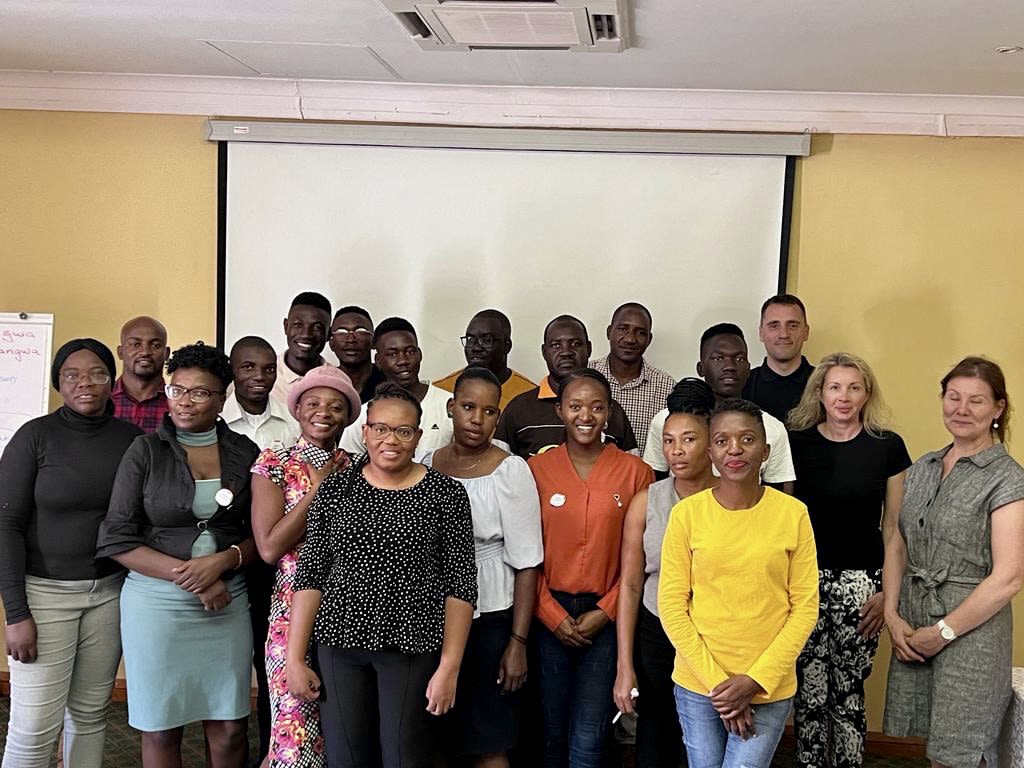
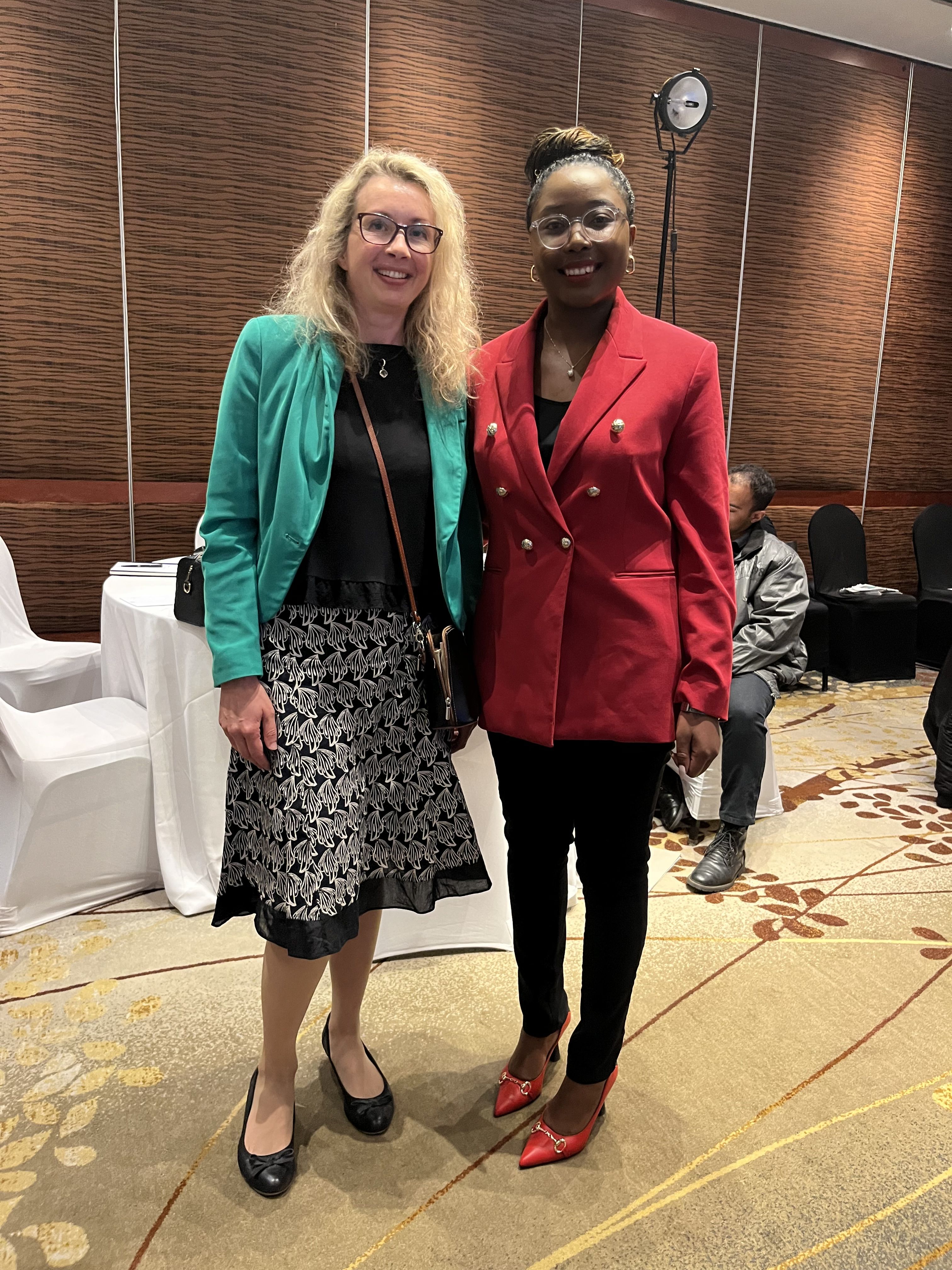
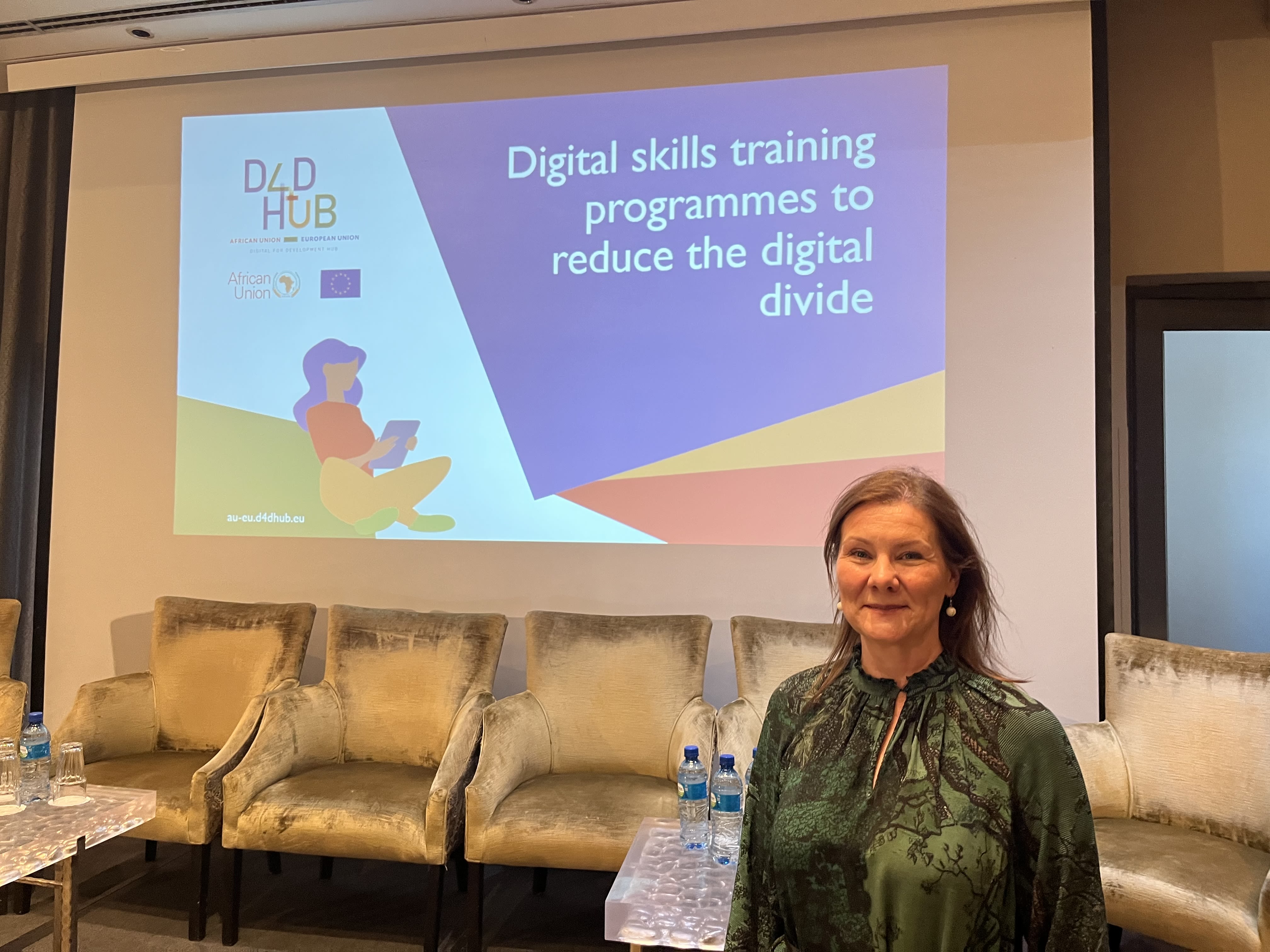
The Gambia- Digital Economy, Open Data and Digital Addressing

Focus on leapfrogging
Representing Team Europe, Team Estonia worked closely with The Gambia on three areas of interest - Digital Economy, Open Data and Digital Addressing. All are vital for unlocking the potential for digitalisation and keeping the user at the centre of attention. In addition, a broader Digital Readiness review was conducted, and a Report was created to analyse the general level of digitalisation and better position the specific areas of interest in the “big picture” of digitalisation in The Gambia.
During the three visits by Team Estonia to The Gambia, it was clear how engaged the country representatives were and how thorough they were in working with Team Estonia to reach a shared vision. Although each field had its experts, there was also great collaboration between the team of experts, who jointly built a good understanding of the status of digital transformation in the Gambia and a common vision with shared values. The lead implementing organisation for the project was the e-Governance Academy (eGA), and the counterpart was the Government of The Gambia represented by the Ministry of Communications and Digital Economy, The Gambia. The outcome was only possible thanks to the driven cooperation and visionary approach from the Ministry of Communications and Digital Economy of The Gambia and all participating stakeholders.
Partnership?
The partnership with The Gambia has focused on key priorities and strategies earmarked as crucial for digitalisation and was built around the central idea that technology can enhance the welfare of societies.
“With the help of such partnerships, it is possible to make great strides in digitalisation. The collaboration resulted from thorough analysis and practical cooperation between Team Estonia and local stakeholders, allowing for a joint understanding of the local situation and a common vision with shared values. Accessing external funding projects, such as the EU-AU Digital For Development (D4D) Hub project, and utilising local resources are great models for working on digitalisation goals. This approach facilitates knowledge transfer, reduces the needed financial burden for investment in digitalisation and, at the same time, boosts the local digital economy. The vision for The Gambia is very clear - digitally transforming The Gambia, making it the most advanced digital society and IT innovation hub in Africa."

Ousman A. Bah
Hon. Minister of Communications and Digital Economy of the Republic of The Gambia


The scope and main results
The deliverables from Team Estonia
The Gambia Digital Economy Masterplan 2024-2034
Envisioning a countrywide strategy with flagship projects leveraging technology to bridge gaps, create jobs, and stimulate economic growth.
Open Data Strategy 2024-2027
Pioneering increased availability and accessibility of open data within the public sector, driving collaboration across private sectors and NGOs.
Digital Readiness Report for The Gambia
Helps to understand the current digital situation and defines the succeeding goals to unlock the country's digital potential.
Digital Addressing Policy and Roadmap 2023
Championing a standardised, efficient national digital addressing system, enabling easy access to crucial services and locations.
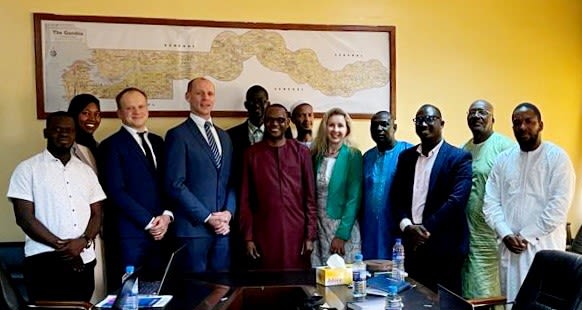
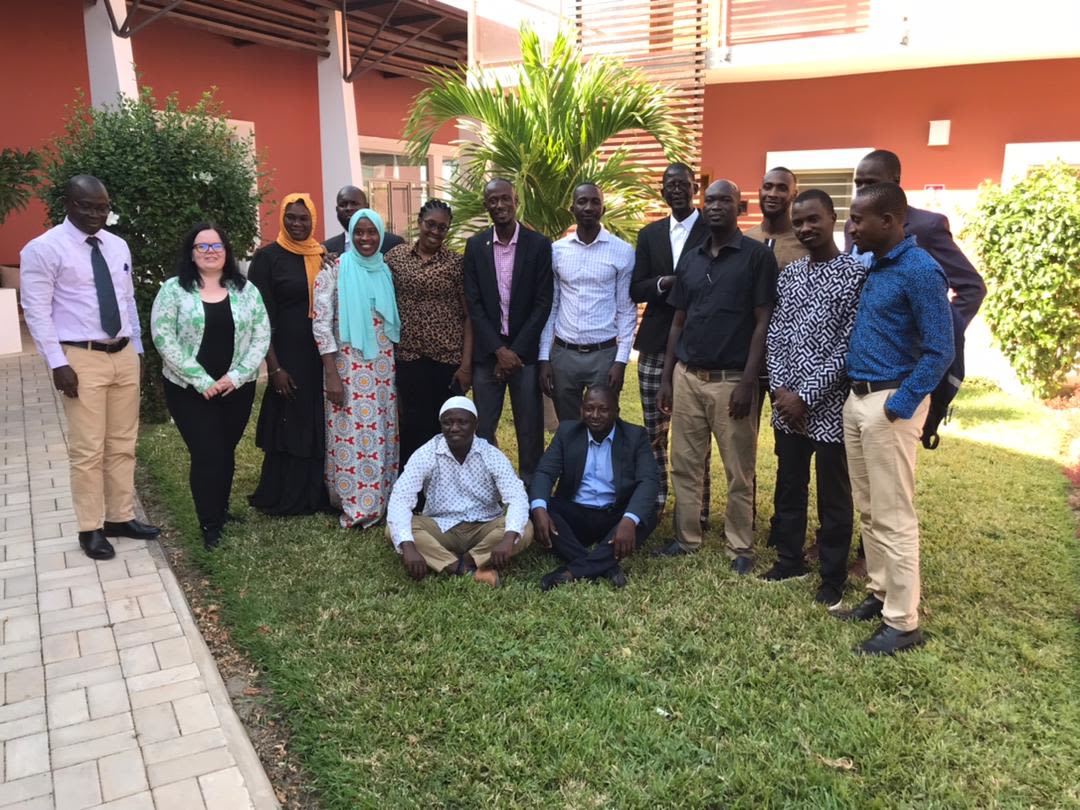
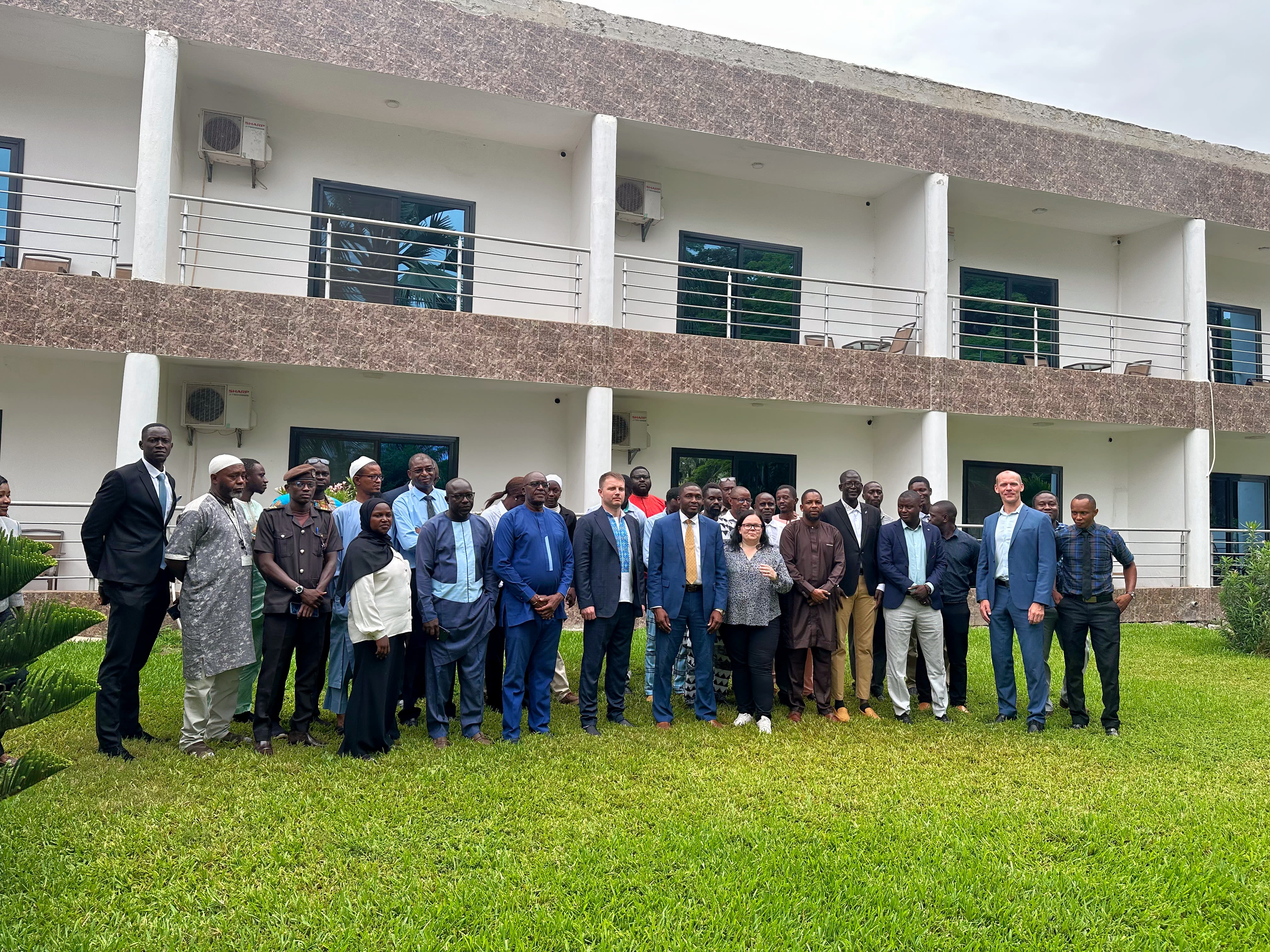
Main takeaways
Digital Readiness Assessment Report
The Gambia is making significant strides in its digital transformation journey, with commendable efforts in digital governance activities and responsive processes. Despite the challenges in change management, the government is actively seeking external funding and leveraging local resources to drive development. Establishing the Ministry of Communications and Digital Economy (MOCDE) and the Gambia ICT Agency is a shining example of the country's determination to foster central coordination and accelerate digital transformation.
Digital Economy Master Plan 2033
The vision for The Gambia has been set high - Africa's most advanced digital society and IT innovation hub. To achieve that, developing a digital economy requires a comprehensive approach. The Gambia must address many different areas of digital transformation. From digital infrastructure development to digital skills development to leveraging technology, digital solutions, and services to connect the unconnected and under-connected, create jobs, and develop the economy. Building the necessary infrastructure, digital skills, and digitization in The Gambia creates a solid foundation to harness these opportunities in the coming decades.
At the same time, digital skills will also provide an opportunity to build up a complex electronics industry to develop The Gambia's advanced machinery and robotics industry.
In collaboration with private sector partners, the government must take bold and decisive action to accelerate the development of the digital economy and achieve the vision of becoming the most advanced digital society and IT innovation hub in Africa.
“Having spent time with the partners from The Gambia both during the missions there and their visit to the e-Governance Conference, it was clear how important it is to have a strong, unified vision for digitalisation in The Gambia. Not only did they want to understand the documents in detail, but also the underlying principles for suggesting the recommendations.”
Digital Addressing Policy
The Gambia has already implemented a proof-of-concept digital address system pilot project, partnering with Google. The provided Digital Addressing Policy and Roadmap considered the previous developments and the European best practices.
The benefit of digital addressing would be tangible for everyone in The Gambia. Providing a unique digital address for each property streamlines the delivery of services, supports emergency response, and enables efficient urban planning and management.
The accompanying Roadmap for implementing the Digital Addressing Policy divides the actions needed under main objectives:
1. Provide a policy, legal and regulatory framework necessary to support the development of a Digital Addressing System for the Gambia.
2. Promote national rollout of digital addressing infrastructure based on up-to-date information technologies.
3. Promote national and regional digital addressing databases and portals that are fully integrated, reliable, and secure to share information seamlessly.
4. Promote human resource capacity development and innovation in Digital Addressing technologies.
5. Engage all stakeholders and promote and ensure the development and availability of a unified and coherent national digital addressing system for the country.
The national digital addressing policy was developed to create a harmonised and standardised format that enhances navigation, logistics, emergency services, and overall governance to ensure more inclusive development and citizen-centric services. These efforts align with the broader goal of digitally transforming the Gambia.
"We had a unique opportunity to combine the best practices from Europe, especially the work we have done in Ukraine in the digital addressing field, with the local setup in The Gambia. And even though our real-life landscape is very different, we can have a similar digital landscape that benefits the end-user.”
Recommendations - Outline for the future
According to Team Estonia’s experts, the future focus in digital governance in The Gambia should be on IT architecture and interoperability, digital identity, and data management on the national level. These factors are essential as they are the foundation that supports other digital governance topics. Moreover, investing in digital services is crucial to empowering vulnerable groups and reducing the digital divide. By focusing on the most used public services that are beneficial and convenient for people, governments can encourage citizens to start using digital services.
In addition, a mobile-first approach and user-friendly and secure services can boost trust towards digital governance and create a positive hands-on experience for citizens. Such an approach will help individuals feel more comfortable and confident using digital services, leading to greater engagement and participation.
“We found a common language with partners in The Gambia. We both put the people who would benefit from technological advancements first. The best way to do it is to think of cooperation, interoperability, and human-centric service design from the beginning.”
Open Data Strategy 2023-2026
Open data is data that can be freely used, re-used and redistributed by anyone - subject only, at most, to the requirement to attribute and sharealike.
Managing, exchanging, and publishing data in The Gambia is challenging. The country lacks a centralised registry, standardisation, or software for data quality and management. This makes it difficult for citizens and companies to access government and public data since there is no comprehensive legal framework for publishing open data.
A participatory process was initiated to create the strategy. Government agencies, the private sector, and civil society organisations were involved in creating a strategy and roadmap.
The Open Data Strategy aims to increase the availability, disclosure, re-use, interoperability, and access of open data in the public sector of The Gambia.
The goal is to establish a foundation for producing and using open data by creating an enabling environment for open data initiatives and establishing rules and responsibilities.
The Action Plan for 2023-2024 outlines specific activities to achieve these goals, including:
- creating a legal framework for open data
- developing a Government Open Data Portal
- establishing open data standards and protocols
- training data holders
- digitising high-value data.
The plan prioritises publishing datasets with high societal, business, and government benefits. By digitising high-value open data and making it available, businesses, research institutions, and civil society can create new innovative services, identify opportunities, increase their involvement in governance, and ultimately - boost economic growth.
The strategy aims to make open data publication and re-use the norm, develop competencies surrounding open data, and position The Gambia as a trendsetter in the field of open data in Africa.
Summary
In today's fast-paced world, digital transformation is becoming increasingly important for countries looking to remain competitive and relevant globally. The Gambia, a small West African nation, is no exception.
The outcome of this collaboration between Team Europe, represented by Estonia, and The Gambia has been fruitful. The Gambia now has a Digital Readiness Report, a Digital Economy Master Plan, an Open Data Strategy, and a Digital Addressing Policy and Roadmap. These documents provide a blueprint for The Gambia's digital transformation, outlining key priorities and strategies for achieving them.
Podcast 🎧 & blog: Laying the groundwork for The Gambia’s digital transformation
In this Digital Government podcast episode Serign Modou Bah, Director of Telecommunications and Postal Services at the Ministry of Communications and Digital Economy of The Gambia will discuss the importance of getting right needs and policy actions, and the role of international partnerships in advancing the country’s digital journey.
Tanzania Digital Readiness Review and Digital Economy Roadmap

The Digital Readiness Review’s objective was to review the current state of digital transformation in Tanzania. The report was based on desk research and interviews with Tanzanian stakeholders from the public, private, and civil society organisations. Special thanks go to the Tanzanian ICT Commission and the Delegation of the European Union to Tanzania.
When analysing digital readiness, it can be done only by keeping the whole country and its development phase in mind. The Government of Tanzania has set a strategic objective to become an upper middle-income country by transforming its economy and society through smart digital technologies. That ambitious goal sets the scene for the digital transformation being crucial for benefitting the whole country’s development. But to achieve those goals, it is necessary to ensure the motivation and maturity of all stakeholders relevant to its efficient implementation. So, on a larger scale, capable and cooperative public service can lead the transformation and create an enabling environment, the motivated private sector can create wealth, and curious citizens are ready to learn relevant skills needed for participating in the digital society and economy.
Tanzania has developed an ambitious Digital Economy Strategic Framework (DESF) to have a digital economy contributing 10% of the national GDP by 2033. To reach this goal, actions are set out in five pillars: basic infrastructure, digital infrastructure and services, enabling technologies, human capital development, and enabling environment.
Digital readiness assessment results
Based on the goals set up and the experience from conducting digital readiness assessments for various countries and territories, 10 topics were chosen for the digital readiness review. Together with outlining the main challenges and recommending further actions, mapping these topics is set to benefit digitalisation in Tanzania.
“Having a digital readiness review gives the policymakers and e-governance implementation teams the data needed to review the current situation from a fresh perspective of international experts and set concrete next steps to best use the resources to get the maximum benefit from digitalisation initiatives. Our role is to motivate and encourage governments around the world to continue their efforts in digital transformation.”.

Marit Lani, eGA, Senior Expert, Head of the Governance and Engagement Competence Center
10 topics of the digital readiness review
1. Political support and strategy
2. Coordination and cooperation
3. Financing model
4. Cybersecurity
5. Data management and secure data exchange
6. Digital identity and digital signature
7. Access to services
8. Digital skills
9. Digital engagement
10. E-commerce and startup ecosystem

For each topic, the current situation was mapped together with a summary of findings for the specific field - divided into strengths and challenges. In addition, specific recommendations were drafted. For example, numerous ambitious plans regarding strategy development & implementation are in place. However, the actual execution and measurement of their success could be improved. Additionally, several public organisations are tasked with digital transformation, which increases the likelihood of overlapping and unnecessary duplication of efforts.
To overcome these challenges, it was recommended and discussed with public officials to develop concise plans for short-term implementation that include specific, measurable targets, well-defined baseline values, and concrete actions and responsibilities. Also, there needs to be a clear separation of duties and responsibilities. Finally, using data in decision-making processes can benefit strategy development and implementation. Here experts also shared the experiences and examples from Estonia and there was good dialogue with local partners to pinpoint solutions that would best suit Tanzania’s circumstances.
One of the challenges in coordination and management is the need to improve cooperation between public entities and stakeholders such as the private sector, academia, and civil society. To address this, recommendations were made to foster cooperation between public bodies at different levels and take a multi-stakeholder approach.
The report also highlighted several challenges in managing cybersecurity in Tanzania. Cybersecurity is covered by most strategic documents, adopted many years apart, which are sometimes not fully in line with each other and do not provide an overview of the overall management of cybersecurity – the parties and responsibilities. Implementation plans also fail to support effective implementation, and cybersecurity awareness and skills must be improved. To address these challenges, the report recommends formalising cybersecurity management, separating ICT and cybersecurity management, reviewing cybersecurity strategy implementation plans, organising cyber hygiene and security training, and engaging in more active practical international cooperation and stakeholder participation.
A critical field for any country looking to maximise digitalisation’s benefits is providing user-friendly digital services. For providing user-friendly services there is a lack of clear ownership, cooperation and data exchange among different public bodies. This results in incomplete or partially digitised services, poor usability, and low take-up of digital services due to poor digital literacy. To overcome these challenges, an integrated approach to service provision is recommended, along with clarity of ownership, optimisation of business processes, user involvement, use of agile methodology, and raising public awareness of existing digital services.

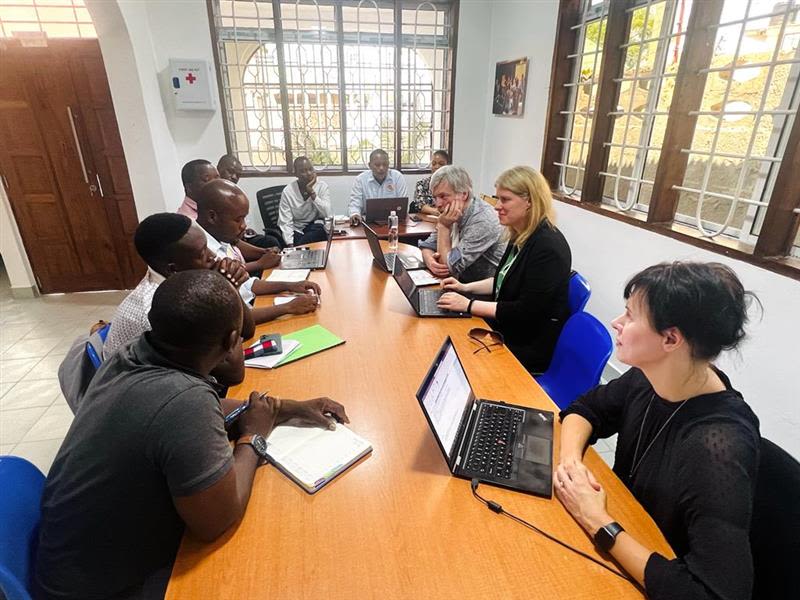

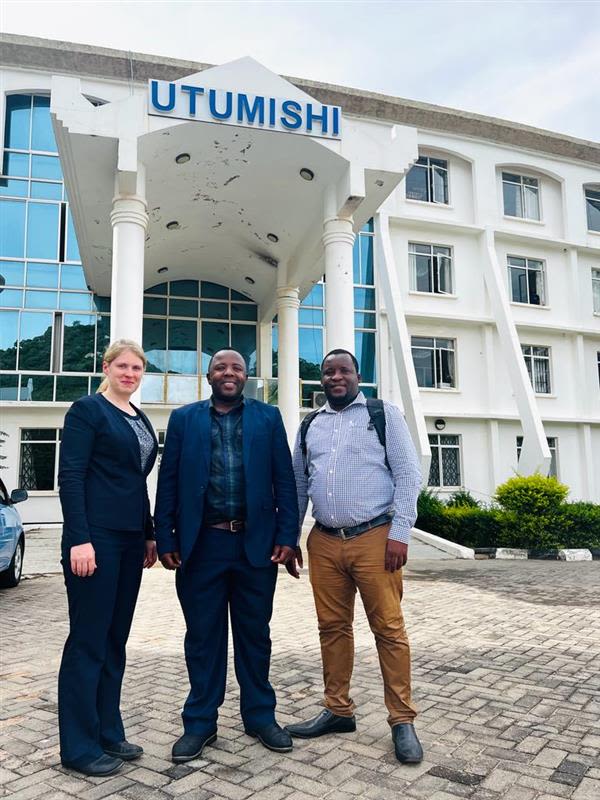
Based on the results of the Digital Readiness Review, a digital economy roadmap was drawn up for Tanzania to achieve its strategic digital development goals. Besides eGAs experts, who were responsible for the Digital Readiness Assessment, the company Aktors, as a member of Estonian Association of Information Technology and Telecommunications (ITL) from Estonia was responsible for the creation of Digital Economy Roadmap and X-Road proof of concept project in Tanzania in collaboration with the Ministry of Information, Communication and Information Technology and the ICT Commission of Tanzania.
The Digital Economy Roadmap gives concrete recommendations to Tanzania to accelerate the development of digital technology and thereby increase the welfare of citizens and increase tax revenue. The roadmap describes in detail the activities in different areas. The roadmap covers the following areas of digital economy development:
1. Startups and e-commerce
2. Digital infrastructure
3. Data management and secure data exchange
4. Tax environment
5. Digital signature and e-identity
6. Cybersecurity
7. Cooperation
8. Digital literacy
In the process of giving recommendations, the key figures of Tanzania's digital economy were invited to Estonia for a study visit, where they were introduced to concrete solutions and the results of digital development. A new approach to start-up companies and a holistic approach to the ecosystem were introduced.
“Tanzania has a great potential in the development of the digital economy, one of the cornerstones of which is the creation of a favorable business environment, that would be inclusive and encouraging for the young generation and would boost the creation of startups. This in return would increase tax receipts and revitalize the economy in general.”
In the process of giving recommendations, the key figures of Tanzania's digital economy were invited to Estonia for a study visit, where they were introduced to concrete solutions and the results of digital development. A new approach to start-up companies and a holistic approach to the ecosystem were introduced.
"A solid roadmap is just the first step. To truly succeed, fostering in-depth conversations within the implementation team and engaging with leading experts is crucial. These discussions ensure everyone aligns on goals and challenges, creating a unified front. The study visit offered the perfect grounds for such dialogue, providing direct access to the invaluable insights of Estonian digital governance practitioners.”
X-Road Proof of Concept
As a very practical result of the project, the data exchange solution X-Road used also in Estonia was implemented as a pilot in Tanzania, which facilitates secure data exchange between Tanzania National Identification Authority, Registration,
Insolvency and Trusteeship Agency and other governmental bodies.
Estonia has used X-Road successfully as the data exchange layer for secure and seamless data exchange between private and public sector entities. X-Road is a comprehensive open-source software and ecosystem solution used in more than 20 countries worldwide. X-Road is a centrally managed but still with de-centralised architecture, distributed data exchange layer between information systems. It provides a standardised and secure way to share digital data between different information systems and applications.
“Tanzanians know very vell how complex accurate and secure information exchange solution can be and we had a chance to show how easy and elegant the X-Road solution is and how much easier business between institutions became. We believe that if Tanzania fully implements the X-Road, the country will become a leader in inter-agency digital cooperation in Africa.”
Next steps for Tanzania
Tanzania, like many other countries, is working towards a digital transformation to improve the competitiveness of its businesses and public services. The government has identified several areas that require attention to achieve this goal. These include strengthening the implementation of digital transformation strategies, central coordination and joint planning of the digital transformation budget and ensuring relevant digital skills for all to participate in the digital economy.
One of the critical areas of focus is the implementation of digital transformation strategies as described in the challenges. It is also essential to create a communication strategy that targets the private sector to increase the spirit of cooperation and ensure that the business sector feels that increasing revenue collection is not the government's only aim.
Another crucial area of focus for Tanzania is the central coordination and joint planning of the digital transformation budget. This involves assigning responsibility for the coordination of digital governance funding to one ministry to ensure that priority projects at the national level get sufficient financing. This approach also ensures that all stakeholders are on the same page regarding the digital transformation budget and that there is adequate funding for critical projects.
Summary
Tanzania's digital transformation requires a multi-faceted approach that focuses on several areas simultaneously. It is crucial that all stakeholders understand the need for a digital society and perceive the implementation of digital transformation as a shared purpose and are treated as partners in digitalisation with their voices and opinions heard. This must also consider the principle of not putting unnecessary burdens on stakeholders, especially those from the private sector. In addition, the government can ensure central coordination and the existence of relevant digital skills for all to participate in the digital economy. With these measures, Tanzania can achieve its digital transformation goals and reach a high level of economic competitiveness and satisfaction with public digital services.

Uganda - testing out the X-Road

Uganda has an ambitious strategy for deploying e-governance solutions and digital tools in public services, including education. However, the country still faces several challenges related to efficient education policy design and implementation that the digital transformation of services can address.
To overcome this, the Ugandan Ministry of Education and Sports (MoES) initiated a project to improve the interoperability of educational information systems. The project aimed to provide recommendations for enhancing interoperability among educational information systems to advance data exchange and data-driven decision-making.
The proposed solution for an interoperable digital data exchange platform in the Proof of Concept (PoC) piloted as part of the project relies on the X-Road technology, which provides a standardised and secure way to produce and consume services between data exchange parties.
Digitalisation in the educational sector
The Education Digital Agenda Strategy 2021-2025 sets digital transformation in education as a vital goal, leading to a stronger, more effective, and inclusive education sector in Uganda. However, the country faces several challenges regarding efficient education policy design and implementation that the digital transformation of services can support.
While there are several functioning platforms in use to handle educational data, there is a need to make these platforms operate on a common data framework securely to make the most strategic use of the data gathered and to gather the data more smartly and effectively, thus giving the data a more significant value in terms of an efficient educational planning and decision-making tool thereby improving access to and quality of education. As the Education Digital Agenda Strategy 2021-2025 states, there is a need to streamline, review, rationalise and harmonise the fragmented ICT initiatives.
The Ugandan Ministry of Education and Sports (MoES) initiated a project to take data-based decision-making to the next level through improved interoperability of educational information systems because service owners and information systems currently work in silos since the data exchange ecosystem UGHUB is at the beginning of implementation..
X-Road technology for data exchange and interoperability
X-Road technology was proposed as a PoC for an interoperable digital data exchange platform. X-Road is a centrally managed but still with de-centralised architecture, distributed data exchange layer between information systems. It provides a standardised and secure way to share digital data between different information systems and applications. While the catalogue of participants and data exchange is centrally managed, the data itself is owned by and stays within the responsibility of the organisations where it is collected. Organisations can use X-Road to exchange information over the Internet while ensuring confidentiality, integrity, and interoperability between data exchange parties. X-Road technology does not differentiate governmental institutions from private companies; the security aspects lie on all users similarly.
Estonia has used X-Road successfully as the data exchange layer for secure and seamless data exchange between private and public sector entities. X-Road is a comprehensive open-source software and ecosystem solution used in more than 20 countries worldwide.
Piloting the X-Road
Team Estonia working on the project involved experts from different organisations. Besides eGAs experts, the company Aktors, as a member of Estonian Association of Information Technology and Telecommunications (ITL) from Estonia was responsible for the piloting of the X-Road in Uganda and setting up the technological solution for it.
The solution was built up as a technology example based around services of Teacher(s) Management Information System. It showcased how seamlessly complex security and information exchange requirements can be handled at full scale, unyielding in even the slightest demand.
In X-Road, each organisation participating in the information exchange process is represented by proxy – Security Server – implementing all security-related requirements in a standard way allowing parties to concentrate on business process related issues. Handled entities are widely accepted Web Services. X-Road also contains a universal client-oriented application – MISP. It allows to consume services by just a browser.
The pilot showed the integration of services on a common platform, unifying interface and introducing standard mechanisms for all interconnected parties. On the other hand, it does not impose a specific technology or product, allowing escape from vendor lock-in.
“There is no need to save the same set of data in different places. Technology gives possibilities to reuse data from the most reliable source without any compromises. The question of where to store different types of data and how to organizationally manage the shared use of data comes to the forefront.”
“It is great to dig deeper into digitalisation of a specific field in a country and hand over something that can be piloted in real life. The project in Uganda enabled just that. It is critical to understand the situation before offering any solutions. And sometimes, the issues are not technological. When we talk about interoperability, we also talk about cooperation and information exchange between organisations, willingness to change procedures and legislation, and support for the changes with capacity building. Piloting is a powerful tool to demonstrate how interoperability works, and it helps to improve data quality and decision making.”

Piret Saartee, eGA, Senior Expert
Improving interoperability
The main objective of this project in Uganda was to provide recommendations for enhancing interoperability among educational information systems to advance data exchange and data-driven decision-making to the next level.
Specific objectives:
· To analyse the current state of educational platforms and data flows between them.
· To propose a roadmap for further activities through recommendations to take interoperability to the next level.
· To demonstrate potential interoperable solutions for more comprehensive and reliable data structures through a pilot.
The previously mentioned is based on the expectations of the management of the Ugandan Ministry of Education and Sports (MoES), highlighting the importance of integration of different information systems, particularly the Technical and vocational education and Training Management Information System (TVET MIS), the Teacher Effectiveness and Learner Assessment (TELA), Education Management Information System (EMIS) and Teacher(s) Management Information System (TMIS), Integrated Inspectorate System (IIS), e-Inspection, e-Learning Platform, among others. While there are already data exchange solutions in use in Uganda, the challenge is to achieve better interoperability across sectors. To demonstrate the possibilities and additional value given by the better use of interoperability, the decentralised X-road is a secure and effective solution both within the public sector entities and with the private sector. A secure data exchange platform enables the government to focus on streamlining data collection processes and regulations, ensuring the quality of data exchanged. Quality of data and effective data exchange enable aiming for “once only” principle when asking data from citizens - a direct benefit for the people from digital transformation as it reduces the time, they have to spend communicating with the government
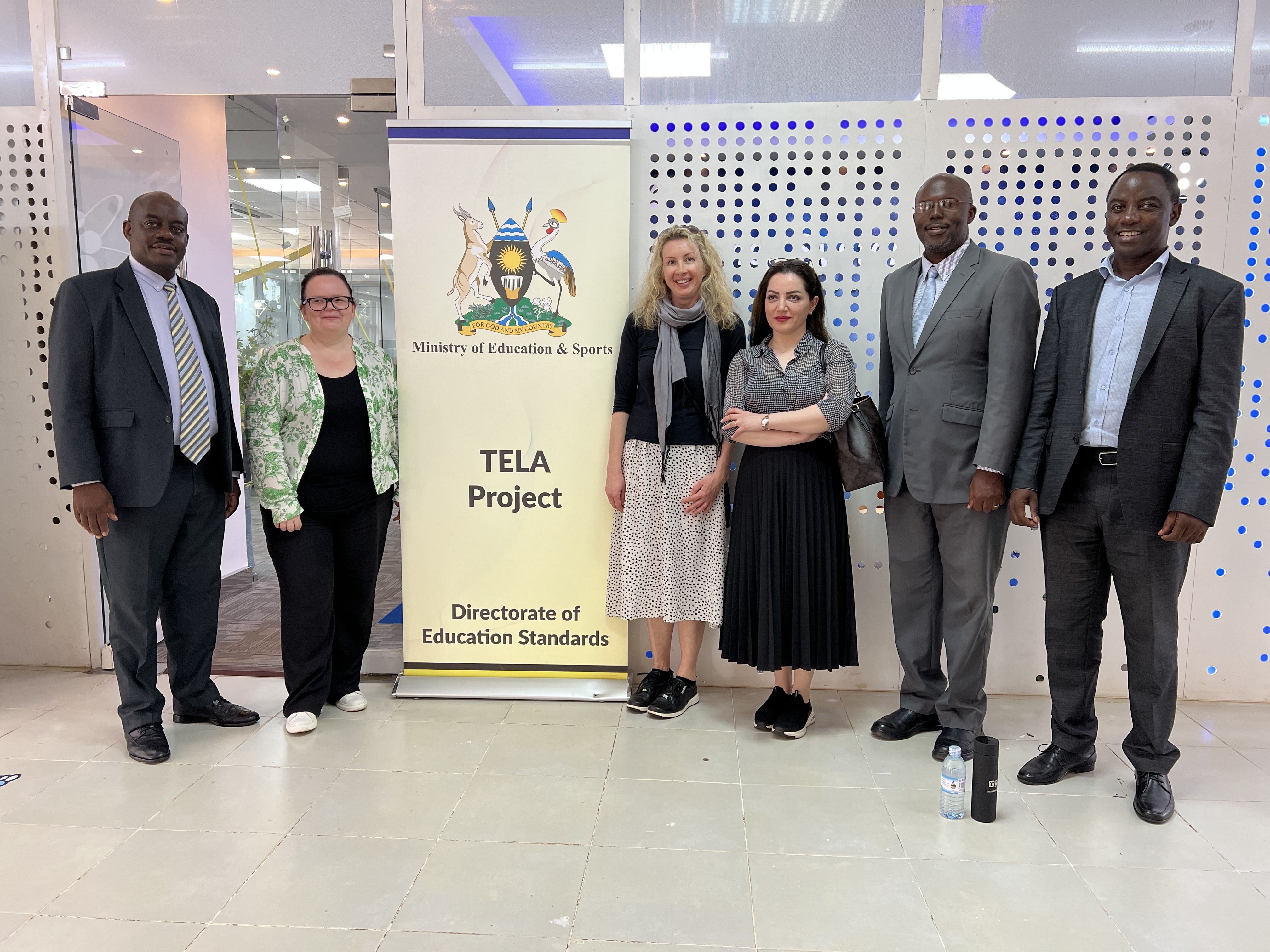
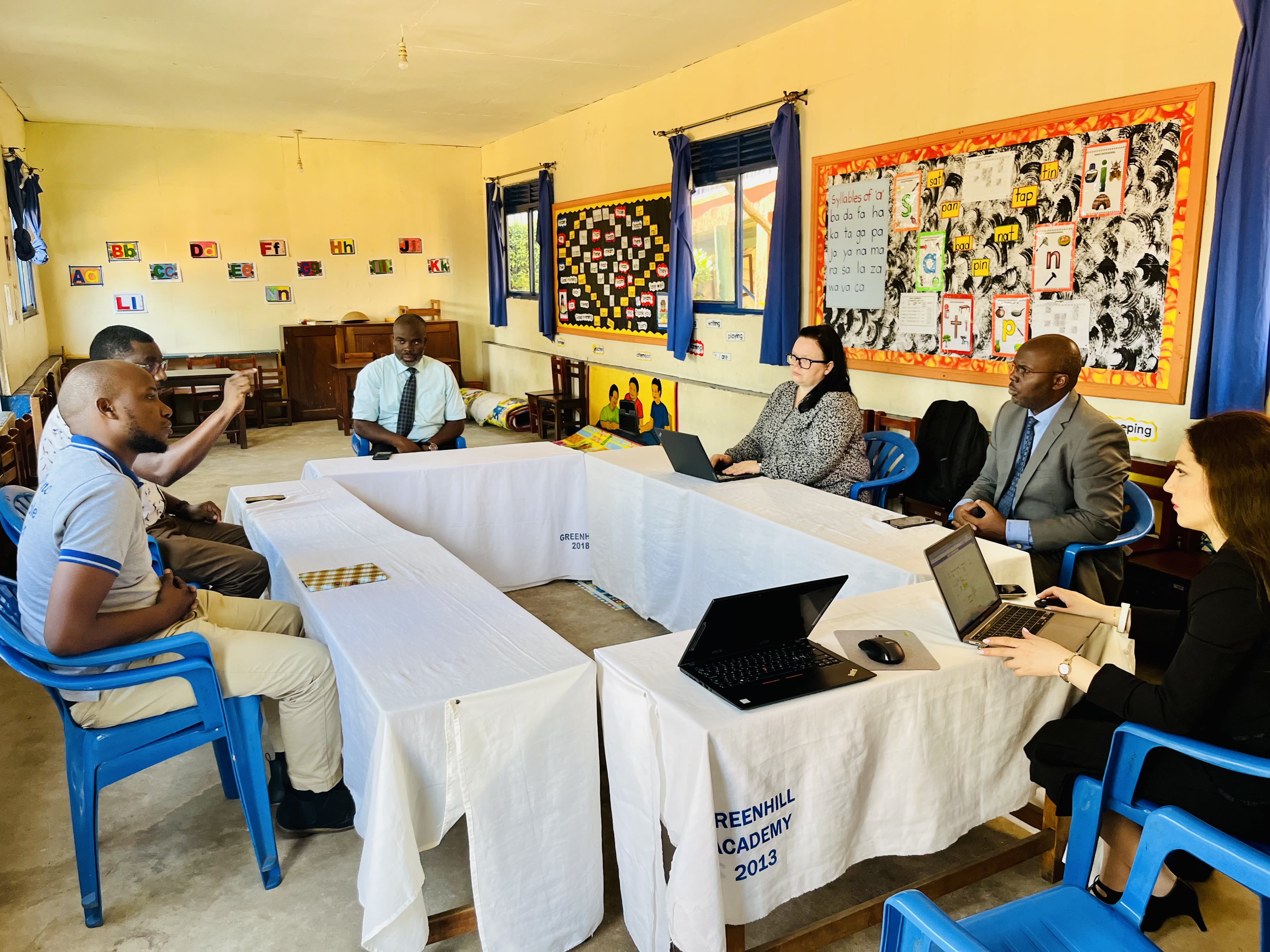
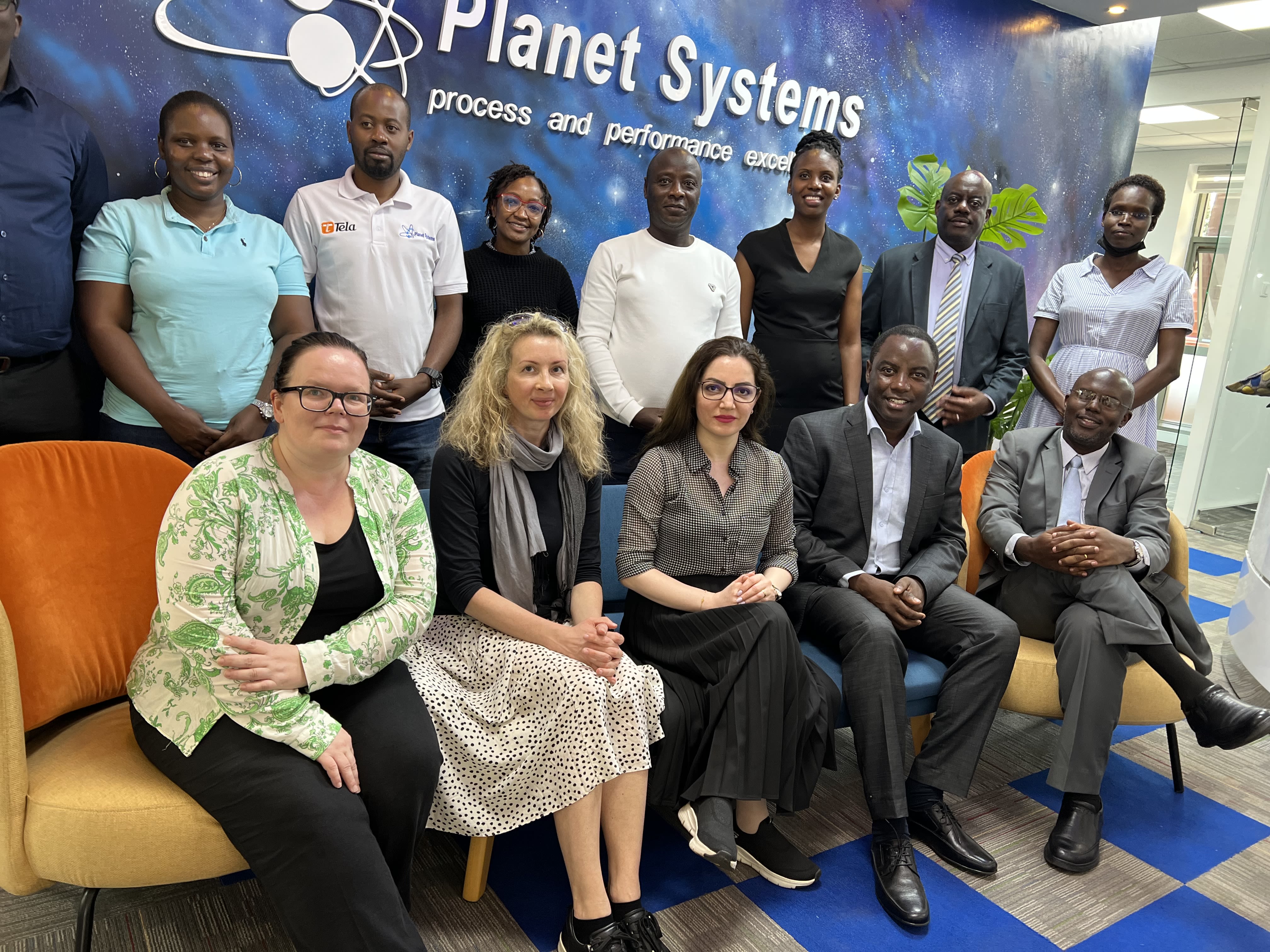
Podcast 🎧 & blog: Uganda´s Digital Transformation
In this Digital Government podcast episode Dr. Amina Zawedde, Permanent Secretary at the Ministry of ICT and National Guidance of Uganda discusses the status of digital transformation in the country, priorities, and the next steps on their journey.